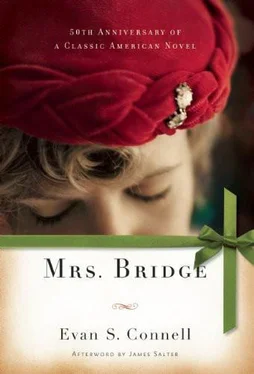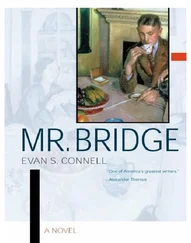Everyone made use of the back door whenever It was convenient, but Douglas seemed to prefer it she had noticed that when he came home from school, although approaching the house from the front, he was apt to go all the way around and come in through the back. From the window of her sewing room upstairs she had seen him do this. She was distressed by his habit because It was customary for members of the family and guests to enter and leave by the front, the back door being used principally by the laundress and the various delivery boys, and by Harriet.
One day at lunch, unable to stand it any longer, she abruptly asked, “Do you have back-door-itis?”
Douglas had just started eating chipped beef; he lowered his knife and fork and gazed at her in stupefaction.
“You need another haircut/’ she said automatically, noticing how shaggy he looked. “And take that pencil from behind your ear. People will think you’re a grocery clerk.”
“What?” said Douglas, blinking.
“What on earth possesses you to always use the back door?”
“I don’t know,” said Douglas.
“Well, then/’ said Mrs. Bridge, “why don’t you do like everyone else?”
Douglas appeared to be thinking this over. Finally he said in the same vacuous tone, “I don’t know.”
“Well,” said Mrs. Bridge, “as long as we have a front door we might as well use it.”
Douglas said he guessed that was right, but he did not sound convinced.
There was no end to the problems of adolescence. Carolyn was beginning to blossom, not only in front but in back, and as she had gotten into the habit of walking with her spine unnecessarily arched she soon became known among the high school boys as “Rumpy/* One of these boys, calling for the first time at her home, absently referred to her by that name. The next day Mrs. Bridge, who was crocheting a nice muffler in case anybody wanted one, asked her about the name.
“That’s nothing. You should hear what they call Ruth/’ said Carolyn.
Mrs. Bridge resumed crocheting with a displeased expression.
55. The Chrysler and the Comb
Mrs. Bridge, emptying wastebaskets, discovered a dirty comb in Ruth’s basket.
‘“What’s this doing here?” Ruth inquired late that afternoon when she got home and found the comb on her dresser.
“I found it in the wastebasket. What was it doing there!”
Ruth said she had thrown it away.
“Do you think we’re made of money?” Mrs. Bridge demanded. “When a comb gets dirty you don’t throw it away, you wash it, young lady.”
“It cost a nickel/* Ruth said angrily. She flung her books onto the bed and stripped off her sweater.
“Nickels don’t grow on trees/* replied Mrs. Bridge, irritated by her manner.
“Nickels don’t grow on trees,” Ruth echoed. She was standing by the window with her hands on her hips; now, exasperated, she pointed to her father’s new Chrysler, which was just then turning into the driveway.
“Put the comb in a basin of warm water with a little ammonia and let it soak/’ Mrs. Bridge went on. ‘In a few minutes you can rinse the “
“I know, I know, I know!” Ruth unzipped her skirt, stepped out of it, and threw it at the closet. She sat down on her bed and began to file her nails.
“So is a nickel going to break us up?** she asked, scowling.
“I wash my comb and I expect you to do the same. It won’t hurt either of us/* replied Mrs. Bridge. “Taking out without putting in will soon reach bottom/* she added and left the room, shutting the door behind her.
For a few minutes Ruth sat on the bed quietly filing her nails and chewing her lower lip; then she snatched the comb and broke it in halt
Christianity meant nothing to Ruth, at least so far as Mrs. Bridge could determine. Ruth went to church reluctantly, sullen and uncommunicative, until she was old enough to defy her mother, knowing her father did not care if she went or not; and when Mrs. Bridge pleaded with her, saying, “Goodness, anyone would think you were a South Sea Islander!” Ruth only sighed and murmured, “Mother, let me be.”
Douglas reacted quite differently; lie objected strenuously when he was a small boy, but later, discovering the church had a basketball team on which he might play i he attended with reasonable regularity, he became more manageable.
Carolyn was no trouble at all. As a child she seemed to enjoy Sunday school, and when she was fourteen she joined the choir. Before long she was reading her Bible at home during the week and, on Sundays, listening quite attentively to the mellow sermons of Dr. Foster. She also joined the Wednesday evening group of teen-agers who met In the church basement.
Mrs. Bridge customarily drove Carolyn to these Wednesday evening meetings and allowed one of the older boys or girls to bring her home. She felt a deep sense of pleasure, a pleasure that bordered on real happiness, whenever she thought of Carolyn’s participation. She herself had never grown as close to the church as she would have liked, though she did not know quite why, and in consequence she blamed herself for Ruth’s failure, and, to a lesser extent, for the fact that If it were not for the basketball team Douglas would drop out, Mrs. Bridge felt proud and reassured each Wednesday evening. There, on the church steps, she beheld a group of nicely dressed, clean, smiling, courteous young people. Invariably they appeared cheerful and confident. Surely, these faces told her, no evil can befall us. Surely, she thought, none would.
The choir, the Sunday sermons, the Wednesday evening group all this failed to satisfy Carolyn’s appetite for religious experience. She became Insatiable. She spent hours reading the Bible; she read the Apocrypha; she had long talks with Dr. Foster. It was not enough. One evening she told her mother site intended to join a group of evangelists*
Mrs. Bridge immediately saw eight or ten lower-middle- class people on a downtown street corner, the women in bonnets and dark shapeless gowns and the men somehow reminding her of Mr* Schumann, who led the high-school band. Tubas in the rain, a tambourine being passed around she had always looked upon these people with a mixture of pity and respect, and, if she could not avoid the tambourine, she put a quarter in it.
“Well,” she said, “it’s an awfully nice idea, o course. I just w r onder if you’d be happy doing it. Let’s see what your father says.”
Mr. Bridge came home about nine o’clock. His briefcase was packed and he was harassed and short-tempered; he told Harriet to fix him a sandwich and some coffee and bring it into his study. Carolyn knew it was a poor moment to announce her decision, but she was too thrilled to wait.
“Nonsense,” he told her when she stopped him on the stairs. “Youll continue with your schooling. I’ve already put in your application at the university.”
That ended the matter. Carolyn was enraged, but, like every other member of the family, with the possible exception of Ruth, who seemed unafraid of him, she did not dare argue.
Mrs. Bridge sympathized with Carolyn, putting an arm around her waist and saying gently, “I expect Dad knows best. But youVe an awfully sweet person, Corky, to think of an idea like that.”
The telephone rang and It was Naomi Gattenberger, the fattest girl in the high school. She always wore a brilliant red coat that hung down to her ankles and a pair of shell-rimmed glasses studded with rhinestones. Her father had recently made a fortune in the used-car business.
Читать дальше












